Oct 25, 2016
How will the Heat move on without Wade, Bosh?
Ahead of Tuesday night's kick-off of the NBA season, TSN.ca looks at the big question facing each of the 30 clubs. In the Southeast, how do the Miami Heat move forward following their ugly break-up with Dwyane Wade and Chris Bosh?
TSN.ca Staff
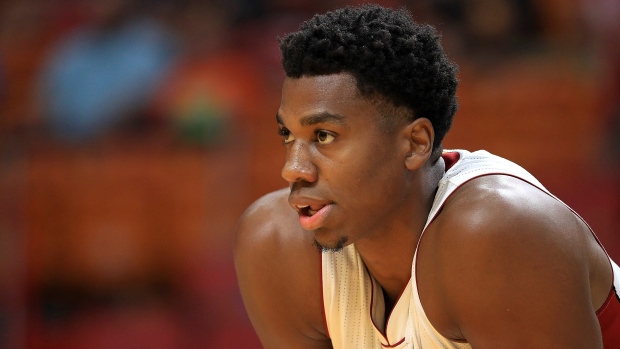
Ahead of Tuesday night's kick-off of the NBA season, TSN.ca looks at the big question facing each of the 30 clubs.
--
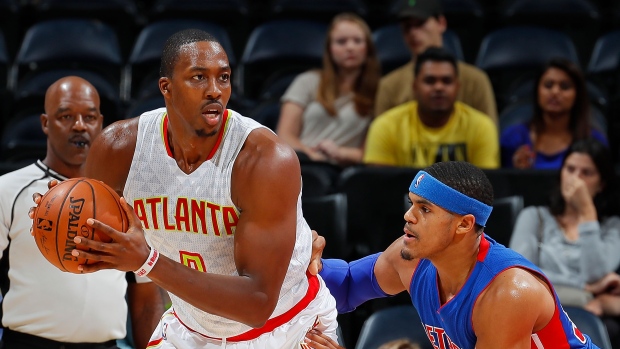
How happy will Howard’s homecoming be?
It’s not unfair to say that Dwight Howard has never lived up to the promise he showed in the early days with the Orlando Magic when the heir-apparent to Shaquille O’Neal led Stan Van Gundy’s team to an appearance in the 2009 NBA Finals. That said, some of the criticism lobbed at the soon-to-be 31-year-old centre has been unwarranted. Questions about his character, drive and work ethic followed him to his ugly year with the Lakers and then on to the past three seasons with the Rockets, where he clashed for much of that spell with James Harden. Howard now has a fresh start in Atlanta, his hometown, and a return to the less physical Eastern Conference.
Howard slots in for the departed Al Horford on Mike Budenholzer’s team, one that has established itself as a perennial playoff team with nine consecutive postseason appearances. Horford – perhaps one of the league’s most underrated stars – gave the Hawks nine years of perimeter scoring as one of the Association’s best offensive bigs. The difference between the two is that Howard – despite declining in field-goal attempts over the past two seasons – is a back-to-the basket guy. As a team that doesn’t post up, the Hawks will have to alter their offence to accommodate Howard’s skill set. If his knees hold up and this new scheme proves effective, Howard could provide an excellent complement to the Hawks’ other all-star in Paul Millsap. The 32-year-old Millsap, heading into a contract year, has quietly rounded into one of the East’s best two-way players, posting a career high 9.0 boards a night last season. They’re joined by the explosive Kent Bazemore, who’s developed into a fine defender and outside shooter.
In the backcourt, the Dennis Schroder-Jeff Teague platoon at the point is no more, with the latter dealt to the Jazz and the young German taking over as the team’s full-time offensive quarterback. Though Teague is probably a better facilitator of the ball than Schroder is a superior floor-spacer, he’s five years older than Schroder and that helped GM Wes Wilcox make the decision on which guy to move. His backcourt partner is an aging Kyle Korver, who is declining at a swift rate.
A 10th-straight playoff appearance should be no issue for the Hawks and they’ll challenge for a division crown, but if Howard’s injuries recur and Schroder struggles as the man in the backcourt, the Hawks could find themselves having difficulty scoring.
--
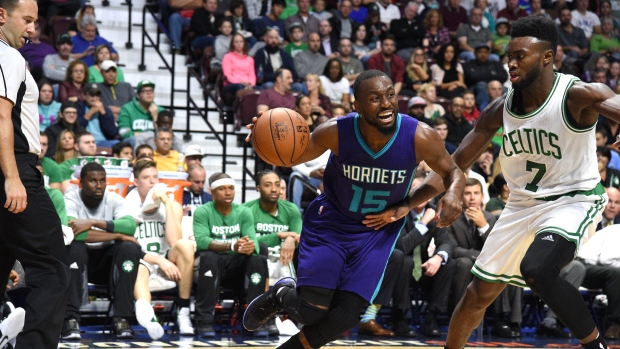
Can the Hornets fight off regression?
The Charlotte Hornets were a Dwyane Wade going off away from winning a playoff series last spring. That would have been a hell of an accomplishment for Steve Clifford’s team after a surprise 48-win season. With the departures of key players and a lack of depth, replicating that success might be difficult this year.
Kemba Walker blew up in 2015-16. The 2011 national champion with UConn set career highs across the board, driving the lane with confidence and shooting at a clip (.427) not seen since his final year as a Huskie. This was thanks in part to the addition of Nicolas Batum (he of the new five-year, $120-million pact signed in the summer), who helped open up shots for Walker. When Walker doesn’t have to create his own shots, he’s that much better. On top of that, the pick-and-roll combo with Cody Zeller proved very effective. Marvin Williams – also fresh off of a new deal – had a monster season from beyond the arc. Already the eighth-best defensive team last season, the Hornets are buoyed by the return of Michael Kidd-Gilchrist, as well, after having missed all but seven games a season ago. MKG has emerged as one of the most tenacious defenders among wing players in the East, but has been hampered by injuries that have cost him 108 games over his first four seasons in the NBA.
Obviously, there’s a good team in place here, but what are the shortcomings? Well, reserve backcourt tandem Jeremy Lin (Brooklyn) and Courtney Lee (New York) left in free agency after fine seasons. And, perhaps, more importantly low-post nightmare Al Jefferson is gone to the Pacers. In their stead come veterans Ramon Sessions, Marco Belinelli and the ghost of Roy Hibbert. Obviously, these reinforcements came in on the cheap (though Belinelli actually cost a first rounder), but they might be asked to shoulder some significant minutes and will be hard-pressed to match the contribution of their predecessors. With what amounts to a fairly thin inside rotation, how much will be asked of Hibbert, who is still under 30, but seems much older? The team might also need more out of Zeller, who was very good last year, cutting down on mistakes and improving offensive efficiency.
By no means is this Charlotte team poor. It just might not be good enough. They’re going to be in the thick of the playoff race and should find themselves with their fourth postseason appearance in its 14-year franchise history, but their inability to close out that Heat series last spring will loom large as a big missed opportunity.
--
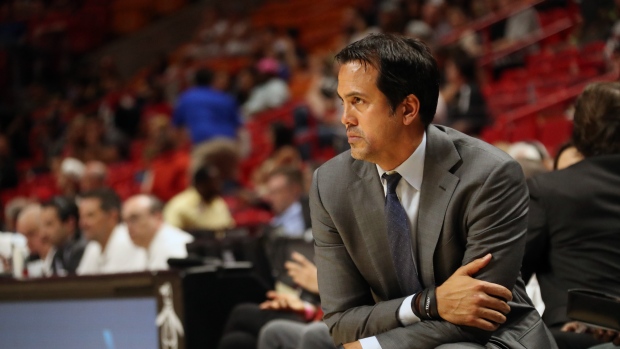
Where do the Heat go without Wade and Bosh?
More notable than who is on the court for the Miami Heat this season is who isn’t. The break from the Big 3 era is official and it’s ugly, with Udonis Haslem the only remaining vestige. It didn’t come as a surprise when LeBron James returned to the Cleveland Cavaliers in the summer of 2014, but the exits of future Hall of Famers, Dwyane Wade and Chris Bosh, have been both shocking and brutal.
Let’s start with Flash, the greatest and most important player in team history. It’s almost unfathomable that Wade would play a game in another jersey after 13 seasons, but 11 all-star appearances and three NBA Titles, but he’s in his hometown of Chicago now. It shouldn’t have come to this. After years of taking less money to facilitate his team’s cap flexibility, owner Micky Arison and Pat Riley wouldn’t reciprocate and Wade got what he was looking for with the Bulls. Yes, Wade is not the player he was once and yes, he’s injury prone, but he remains Dwyane Wade. He’s the reason why the Heat became a juggernaut for much of the last decade and a half. Letting him leave is a black mark on the franchise.
The Chris Bosh situation is entirely different, but equally awful. Now, Bosh is still a member of the Heat in name. He just likely has played his last game for the team already. Bosh has had considerable health issues with blood clots that limited him to just 97 games over the past two seasons and removed him from the playoffs. He is insistent that he can return. The team believes otherwise and he’s been effectively sidelined. How this will eventually play out remains to be seen, but this isn’t a farewell befitting of Bosh’s character.
As for the actual team that will be playing for the Heat this season, being a game away from the Eastern Conference final as they were this past spring is a pipe dream. Skill-wise Goran Dragic is head and shoulders the best player on the team, but he even he might not be long for the Heat, with rumours swirling about a potential move to the Kings. Hassan Whiteside returns on a big four-year, $98-million deal. He shined last season on a team that didn’t even run plays for him and will now have to shoulder a great deal of the offensive load on top of his defensive commitments. Justise Winslow, Tyler Johnson and Josh Richardson will all be given time to make their marks on this team. Dion Waiters is here now, too. He can score, but will he?
This is likely to be a long season for Heat fans and that will do nothing to remove the bitter taste from their mouths that remains from the offseason.
--
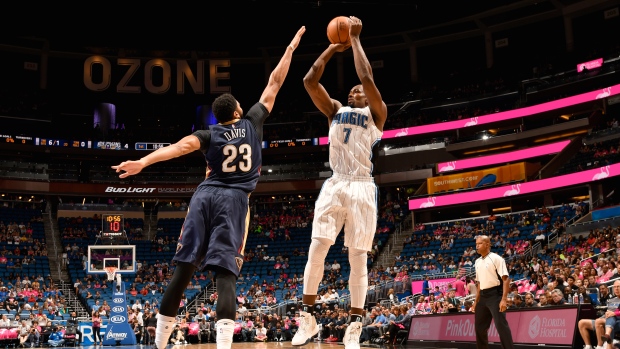
What will Frank Vogel do about the Magic frontcourt?
Frank Vogel is one of the top defensive-minded coaches in the NBA, so it was boon for the Orlando Magic to be able to grab him when they did. There was some fortuitous timing involved (the vacancy existed only because Scott Skiles stepped down unexpectedly and the Pacers surprisingly let Vogel walk after their playoff exit), but the team will take it. Finishing 17th in defensive efficiency means there’s work to be done.
But the Magic’s off-season acquisitions were puzzling ones. Serge Ibaka is an effective, battletested and still only 27, so it’s not surprising that the price to pay for him was going to be steep. But was Victor Oladipo, Ersan Ilyasova and a first-round pick too much, especially when you consider Ibaka is a free agent at season’s end? If your best all-around player last season was Nikola Vucevic, why do you sign Bismack Biyombo to a massive deal when they play the same position and can’t play together at all? Biyombo – a big fan favourite in Toronto – was an absolute monster in the playoffs. For the money he’s getting (four years and $72 million), he’s going to need to replicate that effort in Orlando, but his poor hands mean he’s unlikely to offer anything offensively. How Vogel will manage the minutes of Vucevic and Biyombo will be interesting to watch over the course of the year.
Elsewhere in the frontcourt, Jeff Green was signed to a short-term, big-money deal. Always promising in spurts, Green has never been able to put together a period of consistent, high-level play, so what does that mean for the development of Aaron Gordon? One of the bright up-and-comers on this Magic team (and one who got robbed at the Slam Dunk Contest over All-Star Weekend) is going to need his time on the court to take the next step in his evolution as a pro (over a per-48 basis, he projected at 18.5 points a night last season). Giving significant minutes to Green, though, could derail that.
In the backcourt, D.J. Augustin is a nice piece to spell Elfrid Payton at the point. Payton and Evan Fournier – fresh off of a five-year, $85-million extension – were a serviceable partnership a season ago, though the team’s outside shooting won’t strike fear in the hearts of many. Payton was okay (.326) from beyond the arc from last season, but he’s going to need to improve if he wants to project as a long-term starter in this league.
--
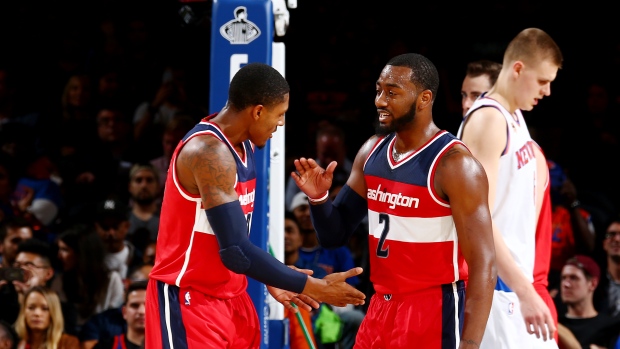
How dynamic is the Wizards’ backcourt duo?
Scott Brooks is a fine NBA coach who took his team to an NBA Finals and won 50 games three times and 60 games once. He knows what it takes to win in the NBA and he’s a fine hire by the Washington Wizards. It goes without saying that some of his success was directly do to coaching a team that had KD, Russ and James Harden, but Brooks is an upgrade on Randy Wittman who wore out his welcome in D.C. (Really, sweeping the Toronto Raptors in the first round of the 2015 playoffs granted him a year-long stay of execution).
Brooks inherits a Wizards team fresh off missing the playoffs and one that has a strained relationship at the centre of it. Though the pair says that any unpleasantness is behind them, the rapport between John Wall and Bradley Beal will be the linchpin to any success the Wizards have this season. The two admitted through interviews in the spring what people had long speculated – that they didn’t exactly get along.
And really, that’s not the end of the world. Teammates don’t have to be best friends to thrive on the court. Shaq and Kobe weren’t exactly Chandler and Joey. What’s more important to the Wizards’ fortunes is the pair’s health. Wall missed the Olympics after having surgery on both knees in May, while Beal has missed a minimum of 19 games a year over the course of his first four seasons in the NBA (he missed 27 this past campaign). Both are (mostly) healthy right now (Beal is coming back from a concussion incurred in the preseason) and will need to be to once again reach the postseason. In Wall, the team has one of the finest point guards in the NBA and a guy who has a legitimate shot at leading the league in assists. Beal’s a tremendous shooter and easily capable of eclipsing the 20.0 PPG mark if he can manage to stay on the court. All full bore, Beal and Wall give DeMar DeRozan and Kyle Lowry a run for the mantle of best backcourt in the East.
Up front, a full season of Markieff Morris bodes well offensively, especially if he plays like he did to finish last season. A stretch-four, Morris should find chemistry with whomever is in the middle, whether it’s Marcin Gortat or newcomer Ian Mahinmi. Coming over from the Pacers, Mahinmi is an upgrade on the oft-injured Nene Hilario at reserve centre.
The Southeast and bottom half of the Eastern Conference playoff picture looks to be fairly open, so the path to a playoff return is a clear one for the Wizards. It remains a matter of taking it, though.



